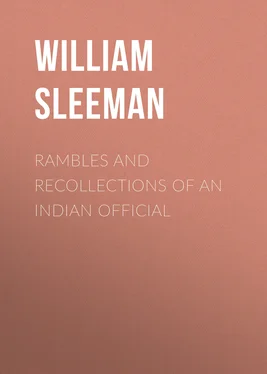William Sleeman - Rambles and Recollections of an Indian Official
Здесь есть возможность читать онлайн «William Sleeman - Rambles and Recollections of an Indian Official» — ознакомительный отрывок электронной книги совершенно бесплатно, а после прочтения отрывка купить полную версию. В некоторых случаях можно слушать аудио, скачать через торрент в формате fb2 и присутствует краткое содержание. Жанр: Путешествия и география, История, foreign_edu, foreign_antique, foreign_prose, на английском языке. Описание произведения, (предисловие) а так же отзывы посетителей доступны на портале библиотеки ЛибКат.
- Название:Rambles and Recollections of an Indian Official
- Автор:
- Жанр:
- Год:неизвестен
- ISBN:нет данных
- Рейтинг книги:4 / 5. Голосов: 1
-
Избранное:Добавить в избранное
- Отзывы:
-
Ваша оценка:
- 80
- 1
- 2
- 3
- 4
- 5
Rambles and Recollections of an Indian Official: краткое содержание, описание и аннотация
Предлагаем к чтению аннотацию, описание, краткое содержание или предисловие (зависит от того, что написал сам автор книги «Rambles and Recollections of an Indian Official»). Если вы не нашли необходимую информацию о книге — напишите в комментариях, мы постараемся отыскать её.
Rambles and Recollections of an Indian Official — читать онлайн ознакомительный отрывок
Ниже представлен текст книги, разбитый по страницам. Система сохранения места последней прочитанной страницы, позволяет с удобством читать онлайн бесплатно книгу «Rambles and Recollections of an Indian Official», без необходимости каждый раз заново искать на чём Вы остановились. Поставьте закладку, и сможете в любой момент перейти на страницу, на которой закончили чтение.
Интервал:
Закладка:
Satisfied myself that it would be unavailing to attempt to save her life, I sent for all the principal members of the family, and consented that she should be suffered to burn herself if they would enter into engagements that no other member of their family should ever do the same. This they all agreed to, and the papers having been drawn out in due form about midday, I sent down notice to the old lady, who seemed extremely pleased and thankful. The ceremonies of bathing were gone through before three [o'clock], while the wood and other combustible materials for a strong fire were collected and put into the pit. After bathing, she called for a 'pan' (betel leaf) and ate it, then rose up, and with one arm on the shoulder of her eldest son, and the other on that of her nephew, approached the fire. I had sentries placed all round, and no other person was allowed to approach within five paces. As she rose up fire was set to the pile, and it was instantly in a blaze. The distance was about 150 yards. She came on with a calm and cheerful countenance, stopped once, and, casting her eyes upward, said, 'Why have they kept me five days from thee, my husband?' On coming to the sentries her supporters stopped; she walked once round the pit, paused a moment, and, while muttering a prayer, threw some flowers into the fire. She then walked up deliberately and steadily to the brink, stepped into the centre of the flame, sat down, and leaning back in the midst as if reposing upon a couch, was consumed without uttering a shriek or betraying one sign of agony.
A few instruments of music had been provided, and they played, as usual, as she approached the fire, not, as is commonly supposed, in order to drown screams, but to prevent the last words of the victim from being heard, as these are supposed to be prophetic, and might become sources of pain or strife to the living. 55 55 An instance of such a prophecy, of a favourable kind, will be found at the end of this chapter; and another, disastrously fulfilled, in Chapter 21, post .
It was not expected that I should yield, and but few people had assembled to witness the sacrifice, so that there was little or nothing in the circumstances immediately around to stimulate her to any extraordinary exertions; and I am persuaded that it was the desire of again being united to her husband in the next world, and the entire confidence that she would be so if she now burned herself, that alone sustained her. From the morning he died (Tuesday) till Wednesday evening she ate 'pans' or betel leaves, but nothing else; and from Wednesday evening she ceased eating them. She drank no water from Tuesday. She went into the fire with the same cloth about her that she had worn in the bed of the river; but it was made wet from a persuasion that even the shadow of any impure thing falling upon her from going to the pile contaminates the woman unless counteracted by the sheet moistened in the holy stream.
I must do the family the justice to say that they all exerted themselves to dissuade the widow from her purpose, and had she lived she would assuredly have been cherished and honoured as the first female member of the whole house. There is no people in the world among whom parents are more loved, honoured, and obeyed than among the Hindoos; and the grandmother is always more honoured than the mother. No queen upon her throne could ever have been approached with more reverence by her subjects than was this old lady by all the members of her family as she sat upon a naked rock in the bed of the river, with only a red rag upon her head and a single-white sheet over her shoulders.
Soon after the battle of Trafalgar I heard a young lady exclaim, 'I could really wish to have had a brother killed in that action'. There is no doubt that a family in which a suttee takes place feels a good deal exalted in its own esteem and that of the community by the sacrifice. The sister of the Rājā of Rīwā was one of four or five wives who burned themselves with the remains of the Rājā of Udaipur; and nothing in the course of his life will ever be recollected by her brother with so much of pride and pleasure, since the Udaipur Rājā is the head of the Rājpūt tribes. 56 56 Rīwā (Rewah) is a considerable principality lying south of Allahabad and Mirzapore and north of Sāgar. The chiefs are Baghēl Rājpūts. The proper title of the Udaipur, or Mēwār, chief is Rānā, not Raja. See 'Annals of Mewar', chapters 1-18, pp. 173-401, in the Popular Edition of Tod's Annals and Antiquities of Rajasthan (Routledge, 1914), an excellent and cheap reprint. The original quarto edition is almost unobtainable.
I asked the old lady when she had first resolved upon becoming a suttee, and she told me that about thirteen years before, while bathing in the river Nerbudda, near the spot where she then sat, with many other females of the family, the resolution had fixed itself in her mind as she looked at the splendid temples on the bank of the river erected by the different branches of the family over the ashes of her female relations who had at different times become suttees. Two, I think, were over her aunts, and one over the mother of her husband. They were very beautiful buildings, and had been erected at great cost and kept in good repair. She told me that she had never mentioned this her resolution to any one from that time, nor breathed a syllable on the subject till she called out 'Sat, sat, sat', 57 57 The masculine form of the word satī (suttee).
when her husband breathed his last with his head in her lap on the bank of the Nerbudda, to which he had been taken when no hopes remained of his surviving the fever of which he died.
Charles Harding, of the Bengal Civil Service, as magistrate of Benares, in 1806 prevented the widow of a Brahman from being burned. Twelve months after her husband's death she had been goaded by her family into the expression of a wish to burn with some relic of her husband, preserved for the purpose. The pile was raised to her at Rāmnagar, 58 58 Well known to tourists as the seat of the Mahārāja of Benares.
some two miles above Benares, on the opposite side of the river Ganges. She was not well secured upon the pile, and as soon as she felt the fire she jumped off and plunged into the river. The people all ran after her along the bank, but the current drove her towards Benares, whence a police boat put off and took her in.
She was almost dead with the fright and the water, in which she had been kept afloat by her clothes. She was taken to Harding; but the whole city of Benares was in an uproar, at the rescue of a Brahman's widow from the funeral pile, for such it had been considered, though the man had been a year dead. Thousands surrounded his house, and his court was filled with the principal men of the city, imploring him to surrender the woman; and among the rest was the poor woman's father, who declared that he could not support his daughter; and that she had, therefore, better be burned, as her husband's family would no longer receive her. The uproar was quite alarming to a young man, who felt all the responsibility upon himself in such a city as 59 59 'of' in text.
Benares, with a population of three hundred thousand people, 60 60 In the author's time no regular census had been taken. His rough estimate was excessive. The census figures, including the cantonments, are: 1872, 175,188; 1901, 209,331; 1911, 203,804.
so prone to popular insurrections, or risings en masse very like them. He long argued the point of the time that had elapsed, and the unwillingness of the woman, but in vain; until at last the thought struck him suddenly, and he said that 'The sacrifice was manifestly unacceptable to their God—that the sacred river, as such, had rejected her; she had, without being able to swim, floated down two miles upon its bosom, in the face of an immense multitude; and it was clear that she had been rejected. Had she been an acceptable sacrifice, after the fire had touched her, the river would have received her'. This satisfied the whole crowd. The father said that, after this unanswerable argument, he would receive his daughter; and the whole crowd dispersed satisfied. 61 61 This Benares story, accidentally omitted from the author's text, was printed as a note at the end of the second volume. It has now been inserted in the place which seems most suitable. Interesting and well-told narratives of several suttees will be found in Bernier, Travels in the Mogul Empire , pp. 306-14, ed. Constable. See also Dubois, Hindu Manners , &c., 3rd ed. (1906), chapter 19.
Интервал:
Закладка:
Похожие книги на «Rambles and Recollections of an Indian Official»
Представляем Вашему вниманию похожие книги на «Rambles and Recollections of an Indian Official» списком для выбора. Мы отобрали схожую по названию и смыслу литературу в надежде предоставить читателям больше вариантов отыскать новые, интересные, ещё непрочитанные произведения.
Обсуждение, отзывы о книге «Rambles and Recollections of an Indian Official» и просто собственные мнения читателей. Оставьте ваши комментарии, напишите, что Вы думаете о произведении, его смысле или главных героях. Укажите что конкретно понравилось, а что нет, и почему Вы так считаете.












